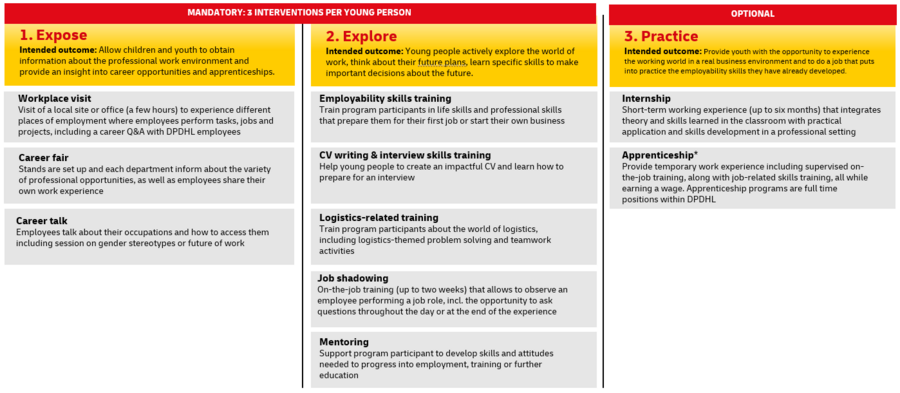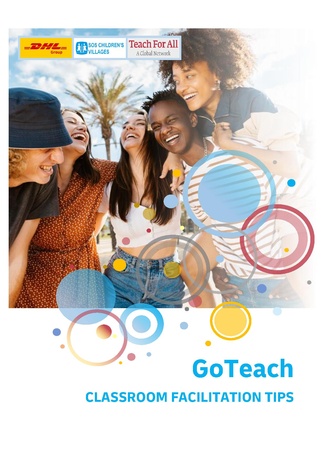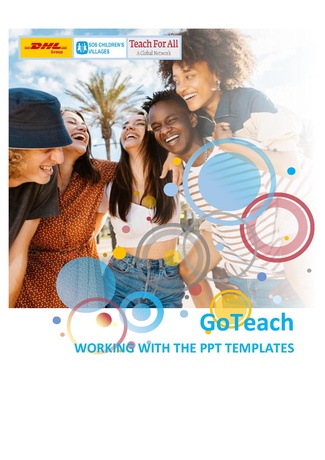GoTeach Activities
GoTeach aims to improve youth employability by equipping young people with the skills and professional contact needed to prepare them for the world of work.
For over a decade, GoTeach has developed a broad and diverse portfolio with the potential to create activities that are perfectly adapted to the local context and based on best-practice examples and feedback collected over many years. Therefore, the activities are ideally suited to the needs of the young people they are intended to help.
In this chapter, you will be introduced to each activity of the expose, explore, and practice framework of GoTeach and will be provided with guidance from the GoTeach Library, including a short introduction, the general framework, and the intended outcomes of each activity.
GoTeach Library
The GoTeach Library is a collection of templates, guides, activity materials, and detailed information for the preparation and implementation of the activities in the frame of GoTeach. Its materials aim to provide good guidance and guarantee quality standard of the activities. Therefore, each subchapter of the activities provides a general introduction into the activity as well as a tailored facilitator guide in English and a supporting PowerPoint for the implementation of the activity to download.
Please find a guide how to work with the PowerPoint templates as well as tips for the facilitation of activities in a classroom setting to download down below.
Expose, Explore, and Practice - GoTeach Activities

Realizing real change in the lives of young people requires a multidimensional approach. It is with this in mind that GoTeach brings together three program pillars, Expose - Explore – Practice, into one holistic program. From 2023 onwards, the minimum requirement in GoTeach is implementing 3 interventions for the same group of young people in one calendar year. Possible mandatory activities have been defined und summarized under the "Expose" and "Explore" pillar. In addition, activities from the "Practice" pillar can complement the offer after meeting the basic requirements first.
The 'Expose' pillar provides youth with first insights into the world of work. Activities such as workplace visits, career fair and career talks allow the participants to obtain information about the professional work environment and provide an insight into career opportunities and apprenticeships.
In the frame of the 'Explore' pillar different tailor-made and needs-driven trainings, supported by skilled volunteers, address the mismatch between formal education and employer demand. They help strengthen employability skills and boost young people’s confidence as they enter the professional world. In this regard, it is also important to have a significant part of the training dedicated to soft skills, which are as fundamental as technical skills. A needs assessment for the young people involved, along with partner workshops, help to identify the individual training needs.
After gaining insights into the world of work through the "Expose" and "Explore" activities, the "Practice" pillar can complement the offer in due consideration of the individual needs of young people and the possibilities available at DHL by pursuing internships or apprenticeships. This gives young people the opportunity to gain real life professional experiences and put the acquired skills to the test.
General Recommendations of implementing activities
- A combination of mentorship and practical activities has proven to be particularly effective, with long-term activities more efficient than one-off events.
- Activities should be implemented together with young people on the basis of their individual needs and interests.
- Partners should look for solutions to identify how best to bridge geographical barriers (schools, villages in remote areas).
- As the primary contact person for the young people, caregivers should be kept informed about the program. This can be done on an individual basis or through information events before activities start. Caregivers should also be invited to graduation ceremonies and involved in the event that conflicts need to be resolved.
- Remember that the program will not be perfect from the outset: Stay open-minded and give stakeholders (children, young people, volunteers, caregivers, etc.) the chance to give feedback to continuously improve the activities.
GoTeach Library Materials


| Chapter lead | Susanne Novotny |
|---|